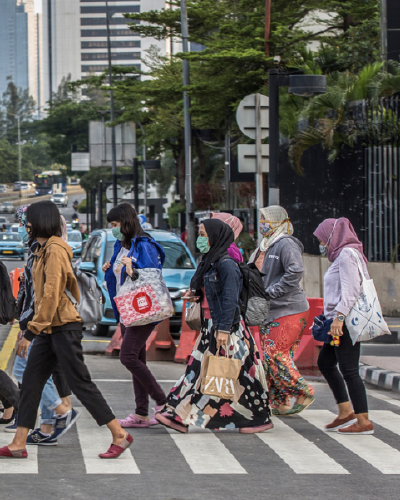In its bid to achieve high-income status by 2045, Indonesia, supported by ADB, the Asian Infrastructure Investment Bank, and KfW, invested in its greatest resource: its people.
workforce skills mismatch
Indonesia has set its sights on becoming a high-income country by 2045. However, one of the major challenges standing in its way is the persistent mismatch between the skills of its workers and the needs of its industries.
Every year, thousands of graduates enter the job market lacking the skills employers are looking for. The result is underemployment, stalled careers, and untapped economic potential—especially in fast-growing sectors where digital and technical competencies are in high demand.
This disconnect is rooted in long-standing issues in the country’s technical and vocational education and training (TVET) system. Institutions have been suboptimal because policies were inconsistent, and the curricula do not reflect market needs. Coordination between educators and employers remains limited. And the shift to digital learning has been slow and uneven. At the same time, insufficient data on human capital progress hampers effective policymaking and resource allocation in education, health care, and social protection.
To help Indonesia turn these challenges into opportunities, the Asian Development Bank (ADB) partnered with the Asian Infrastructure Investment Bank (AIIB) and KfW on the Boosting Productivity Through Human Capital Development Project. With two subprograms completed and a third subprogram underway in 2025, the program aims to build a skilled, resilient workforce that supports sustainable economic growth and prosperity.
linking training to real-world jobs
A major pillar of the first subprogram was aligning education and training with labor market needs. The government launched the Kartu Prakerja (preemployment card) program, offering subsidized training and job search allowances. This initiative was coupled with stronger involvement from the private sector in shaping TVET policy, ensuring that training reflects actual job opportunities.
Digital education also received a major boost. The Indonesia Cyber Education Institute platform has benefited nearly 40,500 students—more than half of them women—across over 800 universities. The Kartu Prakerja program also expanded to serve 18.9 million people across 514 regencies and cities from 2019 to 2024, with women making up 52% of the participants.
“Subprogram 1 laid the groundwork for long-term reforms by aligning human capital investments with local needs and creating real incentives for performance,” said Mohd Sani Mohd Ismail, Director of ADB’s finance sector office.
investing in health and social protection
Improving workforce readiness also means investing in people’s well-being. Subprogram 1’s reforms in the health sector focused on strengthening primary care, promoting health awareness, and expanding community-based maternal and child health care services.
Subprogram 1 also marked a milestone: the introduction of Indonesia’s first unemployment benefit program, offering temporary financial support to laid-off workers. Also, social assistance was linked to the national ID system—strengthening transparency, accountability, and efficiency in social service delivery.
Building on this, Subprogram 2 introduced reskilling and career counseling into the unemployment benefits package, helping people find new, relevant jobs. Reforms also modernized the country’s conditional cash transfer program, improving payment systems and boosting financial inclusion, ensuring that poor families with children could access timely support to meet essential needs.
Addressing the country’s high child stunting rate—still affecting 21.6% of children under 5 in 2024—was a priority. Through subprogram 2, the government adopted a multi-pronged approach that combined nutrition, early childhood development, and stronger accountability at the local level.
In 2023, the government allocated Rp8 trillion (approximately $516 million) in performance-based fiscal transfers to local governments to accelerate progress toward national targets, including stunting reduction. These incentives encouraged subnational actors to take ownership of results.
Health services also became more accessible. Capitation payments for primary care services provided by puskesmas (community health centers) more than doubled—from Rp3,600 to Rp9,000 per beneficiary (approximately $0.23 to $0.58)—allowing for expanded services and better care.
These reforms collectively aimed to boost Indonesia’s Human Capital Index to 57% by 2026, in line with its National Medium-Term Development Plan (2020-2024).
With subprograms 1 and 2 laying the groundwork, Subprogram 3 is now underway. It builds on earlier successes by deepening reforms in education, health, and social protection, ensuring that Indonesia’s development is not only inclusive but also resilient for the future.
“By investing in education, health, and social protection, we are ensuring that the next generation is equipped with the skills and opportunities needed to drive sustainable economic growth.”




